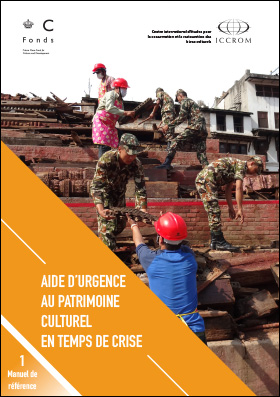Thanks to the generous support of the Principality of Monaco, ICCROM is pleased to announce the digital publication in French of the First Aid to Cultural Heritage in Times of Crisis Handbook and its Toolkit.
This publication is the result of nearly a decade of experience gained by ICCROM in the field, and a close partnership between ICCROM, the Prince Claus Fund and the Smithsonian Cultural Rescue Initiative.
Who is it for? This publication is accessible to all and has been designed for all actors involved in emergency situations. It is addressed, among others, to people living in risk-prone regions in order to enhance their ability to secure their heritage and participate in their own cultural recovery.
What does it consist of? The First Aid to Cultural Heritage in Times of Crisis Handbook provides a practical method and a set of "ready-to-use" tools for securing endangered cultural heritage, both tangible and intangible. The user-friendly workflows help readers to plan and implement coordinated cultural rescue and risk reduction operations that involve local communities, heritage custodians, emergency responders and humanitarians.
These methods and tools for cultural heritage first aid have been field tested in Haiti, Iraq, Syria, Nepal, Philippines and India, yet this is the first time they have been codified into a comprehensive tool.
This resource also serves to improve emergency preparedness within cultural heritage institutions, to serve as a reference for trainers and as a guide for planning and implementing coordinated first aid in the field of cultural heritage.
Written with the key guiding philosophy of ensuring an inclusive attitude and respect for diversity while at the sametime interlocking humanitarian assistance with cultural heritage first aid, this resource provides an essential, ethical framework that will lead to successful outcomes.
Download it, save it to your phone, and share it with as many people as possible so that together we can improve emergency preparedness and response, and build resilience for cultural heritage worldwide.
Further translations of the Handbook and Toolkit are under way, in Spanish, Arabic and Farsi. These translations are part of the key activities of the FAR Programme in its efforts to develop e-learning and awareness raising.
ICCROM invites voluntary translations of all its key publications in the field of Disaster Risk Management for Cultural Heritage.

